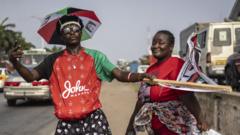Ghana's former President John Mahama returns to power under significant expectations following a decisive electoral victory, defeating Vice-President Mahamudu Bawumia with 56.6% of the votes compared to Bawumia's 41.6%. This marked Mahama's return after eight years in opposition, and political analyst Nansata Yakubu noted his campaign as a "masterclass."
Despite Mahama's victory, overall voter turnout fell short of the previous election, particularly within the New Patriotic Party's (NPP) heartlands—indicative of public discontent with the incumbent administration's performance. As Mahama's supporters rejoiced in his return to office, many, like teacher Belinda Amuzu from Tamale, voiced hopes for significant economic reform and rigorous action against corruption.
The phrase "the hardship" has resonated in Ghana since the economy hit a low in 2022, resulting in a dire cost-of-living crisis that adversely affected Bawumia's reputation as an economic expert. Now, economist Prof. Godfred Bokpin underscores that Mahama's government faces immense responsibilities, calling for credible leadership and streamlined governance to avert future crises.
While Mahama has committed to reducing the cabinet's size from over 80 individuals to about 60, some experts argue for even smaller government operations, prioritizing merit in political appointments over loyalty. His administration is also expected to prioritize job creation, tackling unemployment currently at nearly 15%, and addressing the high cost of living by eliminating certain taxation—referred to by Ghanaians as "nuisance taxes."
Mahama also orchestrated plans to establish Ghana as a "24-hour economy," suggesting tax incentives for nighttime operations, despite historical electrical supply issues that led to his past nickname, "Mr. Dumsor." Promises include removing the controversial electronic transaction levy and the tax on emissions from vehicles.
However, skepticism persists regarding Mahama's ability to fulfill these promises, with concerns raised over budget constraints and fiscal feasibility. He aims to renegotiate terms with the International Monetary Fund (IMF) to enable funding for social programs in a country where 7.3 million people live below the poverty line.
Political analyst Dr. Kwame Asah-Asante points to Mahama's previous presidential experience as a potential advantage in navigating Ghana through its current economic trials. Nevertheless, skepticism remains surrounding Mahama's capability to address corruption effectively, despite commitments to prosecute officials involved in wrongdoing during his administration, which itself faced allegations during his first term.
Dr. Asah-Asante emphasized the need for Mahama to demand accountability from the outgoing government during the transition period, while Mahama himself acknowledged the high expectations of Ghanaians in his victory speech, asserting a commitment to progress saying, "Our best days are ahead of us. Forward ever - backwards never."
Despite Mahama's victory, overall voter turnout fell short of the previous election, particularly within the New Patriotic Party's (NPP) heartlands—indicative of public discontent with the incumbent administration's performance. As Mahama's supporters rejoiced in his return to office, many, like teacher Belinda Amuzu from Tamale, voiced hopes for significant economic reform and rigorous action against corruption.
The phrase "the hardship" has resonated in Ghana since the economy hit a low in 2022, resulting in a dire cost-of-living crisis that adversely affected Bawumia's reputation as an economic expert. Now, economist Prof. Godfred Bokpin underscores that Mahama's government faces immense responsibilities, calling for credible leadership and streamlined governance to avert future crises.
While Mahama has committed to reducing the cabinet's size from over 80 individuals to about 60, some experts argue for even smaller government operations, prioritizing merit in political appointments over loyalty. His administration is also expected to prioritize job creation, tackling unemployment currently at nearly 15%, and addressing the high cost of living by eliminating certain taxation—referred to by Ghanaians as "nuisance taxes."
Mahama also orchestrated plans to establish Ghana as a "24-hour economy," suggesting tax incentives for nighttime operations, despite historical electrical supply issues that led to his past nickname, "Mr. Dumsor." Promises include removing the controversial electronic transaction levy and the tax on emissions from vehicles.
However, skepticism persists regarding Mahama's ability to fulfill these promises, with concerns raised over budget constraints and fiscal feasibility. He aims to renegotiate terms with the International Monetary Fund (IMF) to enable funding for social programs in a country where 7.3 million people live below the poverty line.
Political analyst Dr. Kwame Asah-Asante points to Mahama's previous presidential experience as a potential advantage in navigating Ghana through its current economic trials. Nevertheless, skepticism remains surrounding Mahama's capability to address corruption effectively, despite commitments to prosecute officials involved in wrongdoing during his administration, which itself faced allegations during his first term.
Dr. Asah-Asante emphasized the need for Mahama to demand accountability from the outgoing government during the transition period, while Mahama himself acknowledged the high expectations of Ghanaians in his victory speech, asserting a commitment to progress saying, "Our best days are ahead of us. Forward ever - backwards never."




















